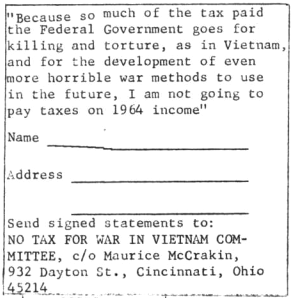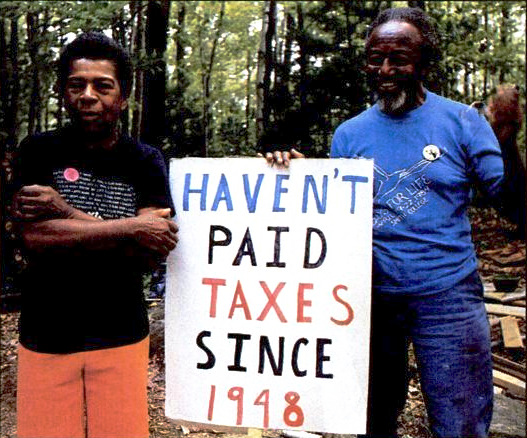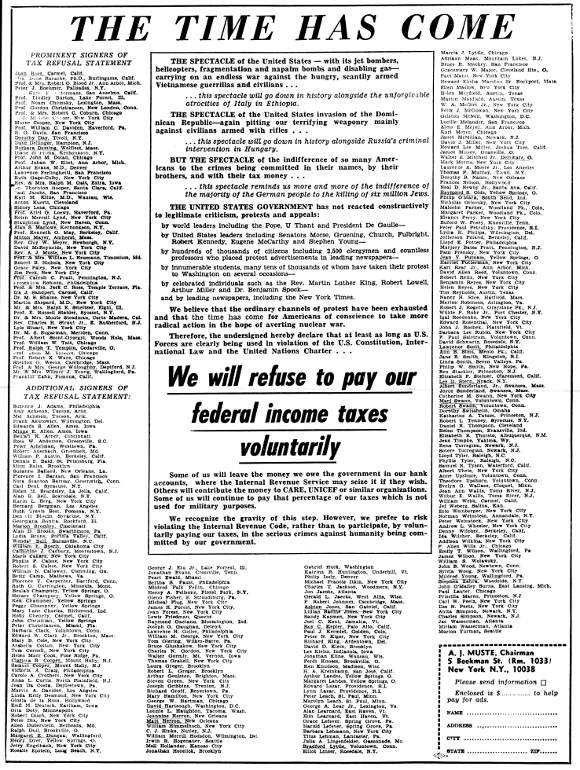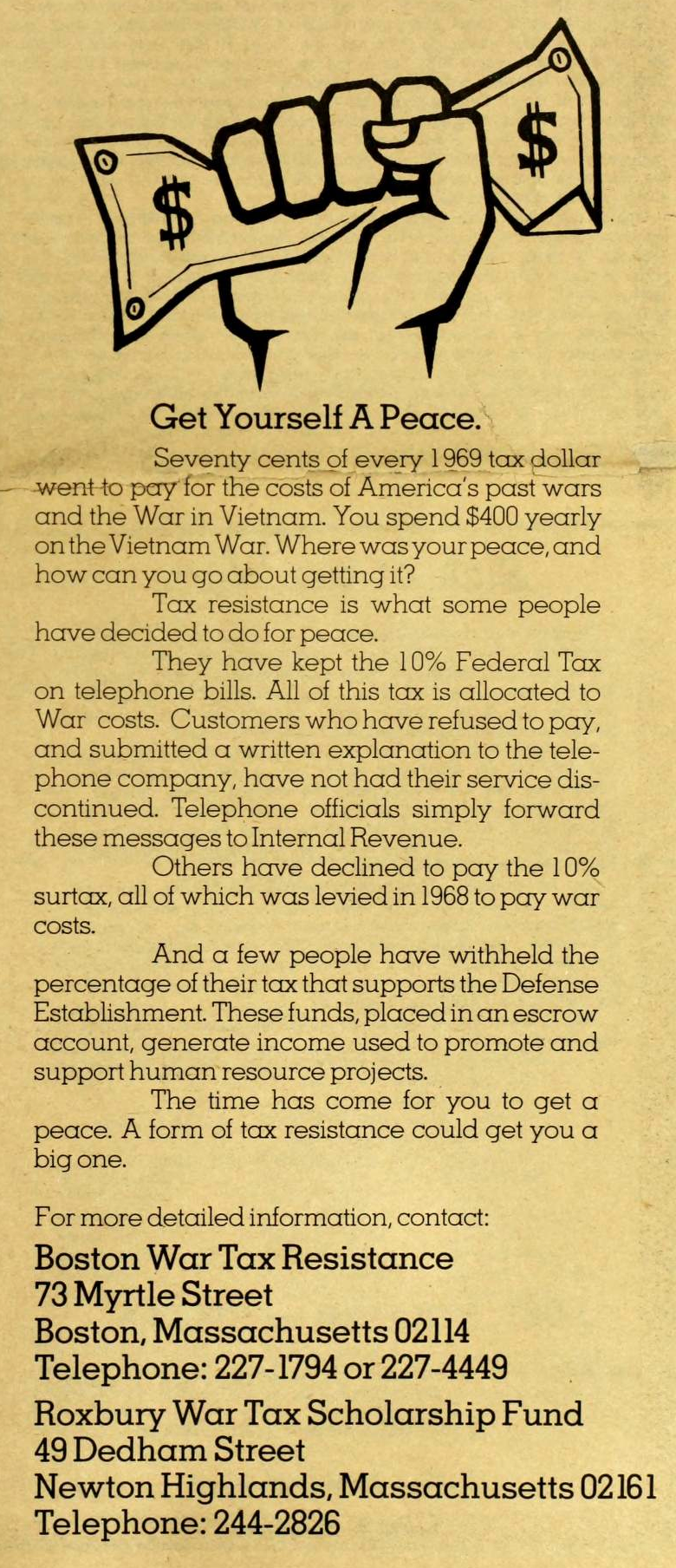A while back, I started looking for examples of ways tax resisters have organized mutual aid pacts to help diffuse the effects of government retaliation. In the course of doing the research, though, I started collecting examples instead of a larger variety of collective projects resisters and their sympathizers have used in support of tax resistance.
Here are some of the examples I found:
- Tax resister “insurance”
For instance, the Breton Association in France, which organized to “form a common stock or fund… to indemnify the subscribers for any expense they may be put to by their refusal to pay any illegal contributions imposed upon the public.”
Another example was the Association of Real Estate Taxpayers in Chicago, which formed a cooperative legal fund to fight an offensive legal battle against the tax.
American war tax resisters today can use the War Tax Resisters Penalty Fund to defray penalties and interest seized by the IRS. The fund is raised as-needed by asking subscribers to contribute an equal amount.
The oath of the Regulator tax resistance movement in the North Carolina colony bound its signers to “bear an equal share in paying and making up [the] loss” if “any of our company be put to expense or under any confinement.”
- Communes, collectives, and co-housing projects.
Some tax resisters have formed mutual support communities. Whiteway Colony was founded to try to live up to Tolstoyan ideals. The members of the Bijou and Agape communities live below a taxable income so as to avoid paying taxes.
- Supporting resisters as an employer
Some members of the Restored Israel of Yahweh ran a construction business and agreed not to withhold federal taxes from the wages of those employees who were fellow-members and who were resisting taxes.
Vivien Kellems refused to withhold taxes from her employees’ wages, saying: “They are all free American citizens, thoroughly capable of performing all of the duties and responsibilities of citizenship for themselves. And so, from this day, I am not collecting nor paying their income taxes for them.”
Charles Kanjama recently urged Kenyans to begin a tax resistance campaign, and said that to foil pay-as-you-earn withholding, “participating employers and employees can enter into a voluntary contract to convert monthly employment into quarterly or half-yearly employment, thus effectively delaying tax liability for several months.”
- Disrupting auctions of seized property
I recounted a dramatic and successful example of the American group “Peacemakers” blocking the sale of Ernest & Marion Bromley’s seized home.
British nonconformists and women’s suffrage activists a century ago also used this tactic. Auctions became rallies, with speeches and banners and crowds that could number in the thousands. Supporters would pack the auction house and refuse to leave their seats. On some occasions, violence broke out. In some cases, auctioneers refused to handle goods that had been seized for tax refusal.
Simply boycotting the auctions and refusing to buy seized goods is one way communities offer support. It was part of the Quaker “Discipline” to refuse to buy seized goods. When Valentine Byler’s horse was seized for non-payment of the social security tax, “no Amish came to bid on the horses and, due to a lack of bidders, they went for a good price, with the harnesses ‘thrown in’ by the auctioneer.”
- Pay cash so as not to leave a paper trail
Jessica Ramer and a Claire Files contributor brought this idea up. If you pay in cash whenever you can, you give the recipient the opportunity to decide whether or not to declare the income.
Cash tips are easy to under-report. I asked about that recently and was told that most people pay with credit card/debit card and that the government now uses a percentage method for tips. They look at the charged meals, look at the number of total meals served, and then look at the charged tips to figure out how much cash tips you received.
(100 meals served. 50 paid with card, tipping 15%. the government calculates 15% from 100 meals even if cash tips are only 10%)
You can help out by tipping more when paying with cash or better yet, when you pay with card, put 1% tip on it and put the rest out as cash. I even leave a note for the server saying “this is your money, don’t tell your boss, or the government. share it with the buss boy if that is the policy.” This will help lower the average tip figures, but still give the nice server what they have earned.
- Use barter to avoid taxable/seizable transactions
Karl Hess found people willing to barter with him as he was dodging IRS seizures:
The other day I welded up a fish-smoking rack for a family in Washington, D.C. It will earn me a year’s supply of smoked fish. At about the same time, I helped a friend dig a foundation. He’ll help me lay the concrete blocks for a workshop. Part of my pay for a lecture at a New England college was the use of the school’s welding shop, to make some metal sculptures. Three such sculptures have paid my attorney’s fees in maintaining the tax resistance which is the reason barter has become such an integral part of my life.
- Manufacture and sell goods as alternatives to taxed products
Before the American Revolution, colonists who opposed Britain’s economic control boycotted British products and began to produce homespun cloth, alternatives to tea, and so forth. Gandhi’s independence campaign in India made the wearing and production of homespun cloth central to the opposition, and the Salt March was focused on the illegal production of untaxed, non-foreign-monopoly salt.
An example today is home-brewed beer (which beats the excise tax on alcoholic beverages).
- Buycotts and boycotts that favor resisting businesses
One report from World War Ⅰ-era America noted that this was a technique used by those who opposed the “Liberty Bonds”:
Efforts to prevent banks from handling the bonds have centered chiefly in Wisconsin, Minnesota, North Dakota, South Dakota, Montana, Missouri and Oklahoma. The President of a Wisconsin bank has advised the Treasury that his depositors, mostly Germans, or of German parentage, have withdrawn many thousands of dollars from his bank because he aided the First Liberty Loan.
These depositors, he added, had taken their accounts to two rival banks on the understanding that those banks would not aid the second Liberty Loan. The two banks, he reported, were not aiding the loan in any way.
Many banks have felt the pressure of German influence in this propaganda, reports indicate. So pronounced was the movement that the States of Minnesota, North and South Dakota, and Montana recently decided that they would withdraw State funds from any bank which did not support the loan.
- Social boycotts / shunning / noncooperation with tax collectors
- Adolf Hausrath writes of Roman-occupied Judaea,
The people knew how to torment these officials of the Roman customs with the petty cruelty which ordinary people develop with irreconcilable persistency, whenever they believe this persistency to be due to their moral indignation. In consequence of the theocratic scruples about the duty of paying taxes, the tax-gatherers were declared to be unclean and half Gentile.… among the Jews the words “tax-gatherers and sinners,” “tax-gatherers and Gentiles,” “tax-gatherers and harlots,” “tax-gatherers, murderers and robbers,” and similar insulting combinations, were not only ready on the tongue and familiar, but were accepted as theocratically identical in meaning. Thrust out from all social intercourse, the tax-gatherers became more and more the pariahs of the Jewish world. With holy horror did the Pharisee sweep past the lost son of Israel who had sold himself to the Gentile for the vilest purpose, and avoid the places which his sinful breath contaminated. Their testimony was not accepted by Jewish tribunals. It was forbidden to sit at table with them or eat of their bread. But their money-chests especially were the summary of all uncleanness and the chief object of pious horror, since their contents consisted of none but unlawful receipts, and every single coin betokened a breach of some theocratic regulation. To exchange their money or receive alms from them might easily put a whole house in the condition of being unclean, and necessitate many purifications. From these relations of the tax-officials to the rest of the population, it can be readily understood that only the refuse of Judaism undertook the office.
- A social boycott of tax collectors was practiced in the years before
the American revolution. John Adams wrote:
At Philadelphia, the Heart-and-Hand Fire Company has expelled Mr. Hughes, the stamp man for that colony. The freemen of Talbot county, in Maryland, have erected a gibbet before the door of the court-house, twenty feet high, and have hanged on it the effigies of a stamp informer in chains, in terrorem till the Stamp Act shall be repealed; and have resolved, unanimously, to hold in utter contempt and abhorrence every stamp officer, and every favorer of the Stamp Act, and to “have no communication with any such person, not even to speak to him, unless to upbraid him with his baseness.” So triumphant is the spirit of liberty everywhere.
- Harassment of tax collectors was a signature action of the Whiskey
Rebellion. An early published resolution of the rebels read in part:
[W]hereas some men may be found amongst us, so far lost to every sense of virtue and feeling for the distresses of this country, as to accept offices for the collection of the duty:
Resolved, therefore, That in future we will consider such persons as unworthy of our friendship; have no intercourse or dealings with them; withdraw from them every assistance, and withhold all the comforts of life which depend upon those duties that as men and fellow citizens we owe to each other; and upon all occasions treat them with that contempt they deserve; and that it be, and it is hereby most earnestly recommended to the people at large to follow the same line of conduct towards them.
- Adolf Hausrath writes of Roman-occupied Judaea,
- Violently resist tax collectors, disrupt trials/auctions, intimidate collaborators
Tax collectors were tarred-and-feathered in America, both before and after the revolution — the violent expulsion of tax collectors was a frequent technique of the Whiskey rebels. Tax collectors have been the targets of violent reprisal at many times and in many places. Because of this, governments have often had to pay high salaries — or, frequently, percentages of the take — to convince collectors to take on the job, which only increases the resentment of those being collected from.
During the French Revolution and its aftermath, customs houses were burned by mobs, tax rolls were destroyed, excise collectors were made to renounce their jobs and then were run out of town — or in some cases killed.
The first Boer War was triggered when an armed group of Boers seized a wagon that was being auctioned after it was distrained for resisted taxes.
The Whiskey rebels threatened to destroy the stills of those distillers who complied in paying the excise tax.
- Boycotts / social boycotts of non-resisters
If a tax resisting movement is large enough, it may be able to dissuade people from paying taxes through boycotts or social boycotts of people who are tax compliant. In Massachusetts, a group enforced a boycott of taxed British imports by declaring that
…we further promise and engage, that we will not purchase any goods of any persons who, preferring their own interest to that of the public, shall import merchandise from Great Britain, until a general importation takes place; or of any trader who purchases his goods of such importer: and that we will hold no intercourse, or connection, or correspondence, with any person who shall purchase goods of such importer, or retailer; and we will hold him dishonored, an enemy to the liberties of his country, and infamous, who shall break this agreement.
- Maintain solidarity in the face of divide-and-conquer tactics
In Germany, the government attempted to break a tax resistance movement by offering to moderate its enforcement efforts against people who could show that they had limited means. Karl Marx, who was promoting the resistance at the time, saw this as a divide-and-conquer tactic:
The intention of the Ministry is only too clear. It wants to divide the democrats; it wants to make the peasants and workers count themselves as non-payers owing to lack of means to pay, in order to split them from those not paying out of regard for legality, and thereby deprive the latter of the support of the former. But this plan will fail; the people realizes that it is responsible for solidarity in the refusal to pay taxes, just as previously it was responsible for solidarity in payment of them.
- Keep a record of the “sufferings” of resisters
The Quakers responded to persecution by keeping careful records of individuals who had suffered thereby. In the archives of Quaker meetings, you can find lists of people who had resisted militia taxes or tithes for establishment church ministers, and what property was distrained by which tax collector.
- Sign petitions and public advertisements, engage in public protests
When the American Amish were trying to resist compulsory enrollment in the social security system, 14,000 of them signed a petition to Congress.
During the Vietnam War, public advertisements were taken out by tax resisters. In , for instance, 448 writers and editors put a full-page ad in the New York Post declaring their intention to refuse to pay taxes for the Vietnam War. The signatories included James Baldwin, Noam Chomsky, Philip K. Dick, Betty Friedan, Allen Ginsberg, Paul Goodman, Paul Krassner, Norman Mailer, Henry Miller, Tillie Olsen, Grace Paley, Thomas Pynchon, Susan Sontag, Benjamin Spock, Gloria Steinem, Norman Thomas, Hunter S. Thompson, Kurt Vonnegut, and Howard Zinn.
This year’s War Tax Boycott, Don’t Buy Bush’s War, and Pledge for Peace campaigns also have a public-signing component.
Protests, rallies, pickets, and the like have been a part of many large-scale tax resistance campaigns.
- Hold resisters’ property as an informal trustee
Some resisters who are vulnerable to property seizure find sympathetic friends who are willing to hold the resisters’ property in their names as a way of foiling seizure. Some war tax resister alternative funds function partially as “warehouse banks” that hold deposits of war tax resisters.
When a frustrated tax collector seized Ammon Hennacy’s protest signs as he was picketing the IRS office — claiming that he planned to auction them off to pay Hennacy’s tax debt — a friend of Hennacy helped him make new signs, each one marked “this sign is the personal property of Joseph Craigmyle.”
- Keep in contact with resisters and express support
After the press reported that Valentine Byler’s horse had been seized by the IRS as he was plowing his field, he got letters of support from all across the country.
- Form groups for mutual support & coordinated decision-making
Here there are too many examples to list.
- Give financial aid to evicted rent strikers
When the Irish Land League launched its rent strike, it claimed that “The funds will be poured out unstintedly to all who may endure eviction in the course of the struggle. Our exiled brothers in America may be relied on to contribute, if necessary, as many millions in money as they have thousands, to starve out the landlords and bring the English tenantry to its knees.”
- Comfort and aid imprisoned resisters
The trick to supporting imprisoned tax resisters is to respect their real needs and desires. When “someone interfered,” as Thoreau put it, and paid his taxes in order to spring him from his night in jail, they thought wrongly that they were doing Thoreau a favor, “for they thought that my chief desire was to stand the other side of that stone wall.”
Juanita Nelson tells of the support she received in jail, where she had been taken in her bathrobe from her home. Her supporters took the time to learn how to support her in a way that was appropriate to her resistance:
Two fellow pacifists, one of them also a tax refuser, had been permitted to come to me, since I would not go to them. I asked them what was uppermost in my mind, what they’d do about getting properly dressed? They said that this was something I would have to settle for myself. I sensed that they thought it the better part of wisdom and modesty for me to be dressed for my appearance in court. They were more concerned about the public relations aspect of getting across the witness than I was. They were also genuinely concerned, I knew, about making their actions truly nonviolent, cognizant of the other person’s feelings, attitudes and readiness. I was shaken enough to concede that I would like to have my clothes at hand, in case I decided I would feel more at ease in them. The older visitor, a dignified man with white hair, agreed to go for the clothes in a taxicab.
They left, and on their heels came another visitor. She had been told that in permitting her to come up, the officials were treating me with more courtesy than I was according them. It was her assessment that the chief deputy was hopeful that someone would be able to hammer some sense into me and was willing to make concessions in that hope. But he had misjudged the reliance he might place in her — she was not as critical as the men. She did not know what she would do, but she thought she might wish to have the strength and the audacity to carry through in the vein in which I had started.
And she said. “You know, you look like a female Gandhi in that robe. You look, well, dignified.”
That was my first encouragement. Everyone else had tended to make me feel like a fool of the first water, had confirmed fears I already had on that score. My respect and admiration for Gandhi, though not uncritical, was deep. And if I in any way resembled him in appearance I was prepared to try to emulate a more becoming state of mind. I reminded myself, too, that I had on considerably more than the loincloth in which Gandhi was able to greet kings and statesmen with ease. I need not be unduly perturbed about wearing a robe into the presence of his honor.
- Support the families of imprisoned resisters
When Gandhi was preparing the groundwork for a tax refusal campaign in India, he noted that the Indian National Congress “should undertake to feed the wives and families of those who may be imprisoned.”
- Study the law, give legal support
When Elizabeth Cady Stanton was contemplating a tax resistance campaign for women’s suffrage in the United States, she noted, “One thing is certain, this course will necessarily involve a good deal of litigation, and we shall need lawyers of our own sex whose intellects, sharpened by their interests, shall be quick to discover the loopholes of retreat.”
- Combine redirected taxes for dramatic charity giveaways
Larry Rosenwald wrote, of this technique, “To sit on the Grants and Loans Committee of New England War Tax Resistance, and to dispense the interest on refused taxes to a youth group in Chelsea, a video for cable television on United States involvement in Central America, and a people’s garden in Roxbury is to be reminded of the ideal community, however blurred and fragmented, that war tax resistance is done on behalf of, in the hope of helping to make it clear and whole.”
Can you think of any I’ve missed?

![Your Tax Dollars At Work in Vietnam: It takes men [and] money to run a war. Thousands of young men are refusing to participate in war because it outrages their deepest moral feelings. Thousands of other Americans are standing in solidarity with them by refusing, because of conscientious conviction, to pay all or part of their federal taxes. War tax resistance is one more obstacle to Pentagon and military-corporation control of our society. It is another way of saying that you utterly reject squandering of our resources on mass violence and the machinery of death; that you condemn government neglect of programs to give adequate medical care, education and housing, combat pollution, and guarantee every family an adequate income. There are many ways of resisting federal war taxes. Some people refuse their federal excise telephone tax. Others don’t pay the balance due, on income taxes.](02Apr70.png)







